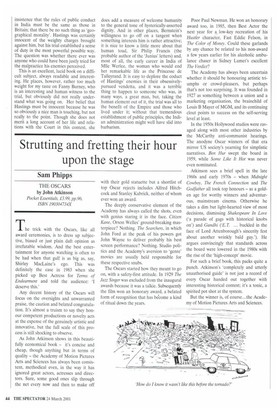Strutting and fretting their hour upon the stage
Sam Phipps
THE OSCARS by John Atkinson Pocket Essentials, £3.99, pp.96, ISBN I90304734X The trick with the Oscars, like all award ceremonies, is to dress up subjective, biased or just plain daft opinion as irrefutable wisdom. And the best entertainment for anyone watching is often to be had when that gulf is as big as, say, Shirley MacLaine's ego. This was definitely the case in 1983 when she picked up Best Actress for Terms of Endearment and told the audience: 'I deserve this.'
Any decent history of the Oscars will focus on the oversights and unwarranted praise, the caution and belated congratulation. It's almost a truism to say they honour competent productions or novelty acts at the expense of the genuinely artistic and innovative, but the full scale of this process is still shocking to observe.
As John Atkinson shows in this beautifully economical book — it's concise and cheap, though anything but in terms of quality — the Academy of Motion Pictures Arts and Sciences has always been consistent, methodical even, in the way it has ignored great actors, actresses and directors. Sure, some good ones slip through the net every now and then to make off with their gold statuette but a shortlist of top Oscar rejects includes Alfred Hitchcock and Stanley Kubrick, neither of whom ever won an award.
The deeply conservative element of the Academy has always called the shots, even with genius staring it in the face. Citizen Kane, Orson Welles' ground-breaking masterpiece? Nothing. The Searchers, in which John Ford at the peak of his powers got John Wayne to deliver probably his best screen performance? Nothing. Studio politics and the Academy's aversion to 'genre' movies are usually held responsible for these respective snubs.
The Oscars started how they meant to go on, with a safety-first attitude. In 1929 The Jazz Singer was excluded from the inaugural awards because it was a talkie. Subsequently the film won an honorary award, a belated form of recognition that has become a kind of ritual down the years. Poor Paul Newman He won an honorary award too, in 1985, then Best Actor the next year for a_ low-key recreation of his Hustler character, Fast Eddie Fe!son, in The Color of Money. Could these garlands by any chance be related to his non-award a few years earlier for his alcoholic ambulance chaser in Sidney Lumet's excellent The Verdict?
The Academy has always been uncertain whether it should be honouring artistic triumphs or crowd-pleasers, but perhaps that's not too surprising. It was founded in 1927 as something between a union and a marketing organisation, the brainchild of Louis B Mayer of MGM, and its continuing clout points to success on the self-serving level at least.
In the 1950s Hollywood studios were ravaged along with most other industries by the McCarthy anti-communist hearings. The anodyne Oscar winners of that era mirror US society's yearning for simplistic narratives. Ben Hur swept the board in 1959, while Some Like It Hot was never even nominated.
Atkinson sees a brief spell in the late 1960s and early 1970s — when Midnight Cowboy, The French Connection and The Godfather all took top honours — as a golden age for worthy winners and adventurous, mainstream cinema. Otherwise he takes a dim but light-hearted view of most decisions, dismissing Shakespeare In Love Ca parade of gags with historical knobs on') and Gandhi ('E.T ... buckled in the face of Lord Attenborough's sincerity fest about another wrinkly bald guy.'). He argues convincingly that standards across the board were lowered in the 1980s with the rise of the 'high-concept' movie.
For such a brief book, this packs quite a punch. Atkinson's 'completely and utterly unauthorised guide' is not just a record of every Oscar handed out together with interesting historical context; it's a tonic, a spirited pot shot at the system.
But the winner is, of course... the Academy of Motion Pictures Arts and Sciences.














































































 Previous page
Previous page